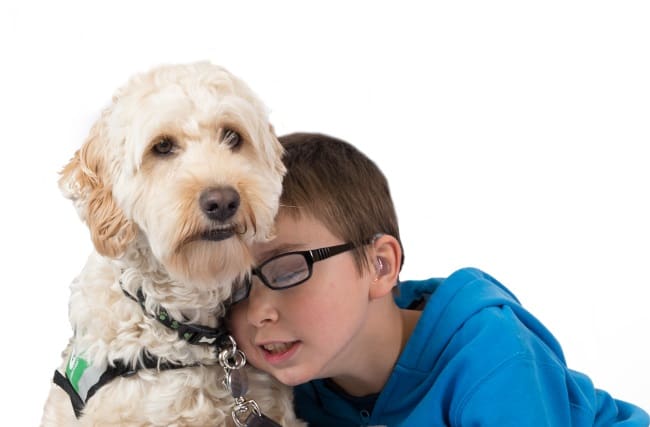As Dogs for Good celebrates 30 years of transforming lives, we wanted to share eight ways assistance dogs help children with physical disabilities.
In 2004, Dogs for Good became the first UK organisation to train assistance dogs for children with disabilities.

- Practical help
Every assistance dog offers lots of practical support – it’s a great feeling for any child with a disability not to have to rely on mum and dad’s help so much. Dogs can retrieve or fetch items from a games console to a pair of slippers, they can help a child dress and undress and open doors. - A best friend
A dog is always there – for the good times and the bad. Kathy, whose son Isaac has Duchenne muscular dystrophy says the special bond he has with assistance dog Elsie has changed his world: “Elsie speaks of the joy in the world. She stands in the doorway with her tail wagging, saying ‘Come on, let’s get going! There are beautiful places to go, balls to chase, muddy puddles to splash in, friends to meet up with and fun to be had!” - More restful sleep
For a child with a physical disability, knowing that their assistance dog is there to get help if they need it, snuggle with if they’re a bit lonely or just to chat to if they wake up in the small hours can keep things calm and aid restful nights. - Helping with physiotherapy
The daily routine of physiotherapy for a disabled child can be much more fun with an assistance dog around. Stretching out to reach your dog, playing ball games or games of tug can help to increase strength and movement and all with a waggy tail to offer encouragement. - Time outside
An assistance dog becomes a friend to play games with at home and at the park. Many families say they go out together much more after getting an assistance dog. - Laughter
A dog’s sense of playfulness helps to bring a new sense of fun to the household. Many of our families say they laugh more since having an assistance dog, which in turn, brings down stress levels. “Mornings were harrowing before Rosie came along,” says Oliver’s mum, Lisa. “Now, Rosie gets him up and the first thing I hear in the morning is Oliver’s giggles as Rosie jumps on his bed and encourages him to start the new day.” - Social icebreaker
Dogs are an incredible icebreaker. Those benefits can be felt even more greatly when you have a child with a disability. “People didn’t used to know what to say to Billy,” says Billy’s mum, Jess. “Now, they look at him and Ella, smile and some come up to talk. Ella makes interaction with other people possible and it’s so good for Billy.” - Improved confidence
Demi was partnered with her assistance dog Bumble when she was a teenager. Now a University graduate she says: “With Bumble by my side I believed in myself far more. I don’t think that I would have gone to University if I hadn’t had Bumble with me. With her help, I was able to complete my degree and get the job I dreamed of.”
Dogs for Good has trained over 100 assistance dogs to help children with a wide variety of physical disabilities including cerebral palsy, spinal injuries and Duchenne muscular dystrophy.